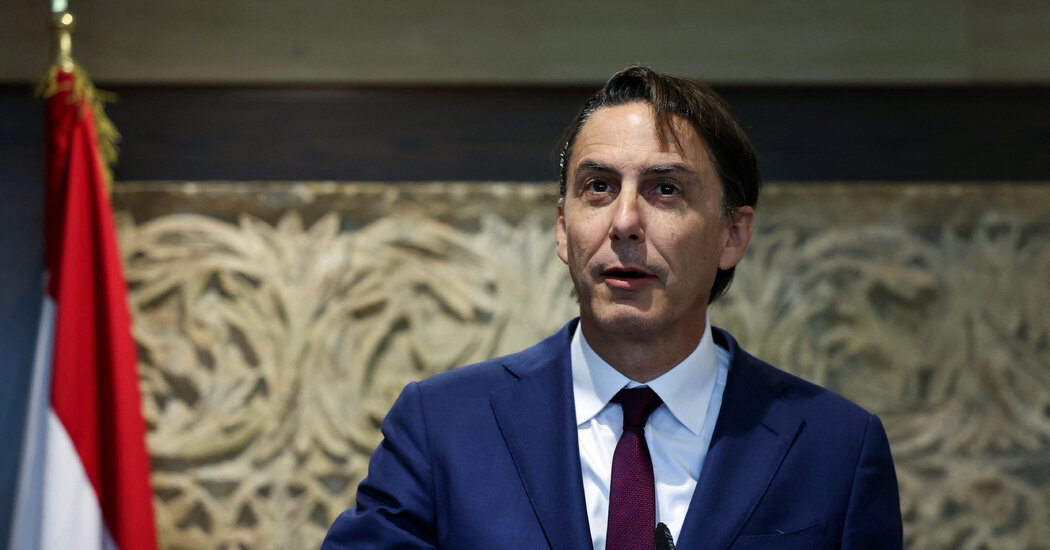Top News
Amos Hochstein, a senior adviser to President Biden, met Tuesday with senior Lebanese officials in Beirut, where he pressed for a diplomatic solution as increasingly deadly skirmishes between Israel and Hezbollah, the Iran-backed Lebanese militia, have made the situation on the Israel-Lebanon border dangerously volatile.
For the past eight months, as the war has raged in Gaza, another battle has unfurled along Israel’s northern border. In that time, Hezbollah, a well-armed and battle-tested fighting force, and the Israeli military have played a risky game of tit-for-tat, carrying out attacks that have flexed their muscles but avoided full-blown war. Despite the seemingly measured approach the sides have taken, civilians in both countries have been killed and more than 150,000 people have fled their homes along the border.
As the fighting has intensified, any miscalculation risks drawing both sides into a wider escalation. Given the strength of Hezbollah as a fighting force, a full-scale war between Israel and the group could devastate both countries.
“The situation is serious,” Mr. Hochstein told reporters in Beirut. “We have seen an escalation over the last few weeks, and what President Biden wants to do is to avoid a further escalation to a greater war.”
“It will take everyone’s interest in ending this conflict now, and we believe there is a pathway, diplomatically, to do it — if the sides agree to it,” he said.
Hezbollah, Lebanon’s most powerful military and political force, is far more powerful and better armed than it was when it last went to war with Israel in 2006. Unlike Hamas, the Palestinian militia fighting Israel in Gaza, Hezbollah’s troops are highly trained combatants and the group possesses long-range, precision-guided missiles that can strike targets deep inside Israel.
In Israel, military planners see the specter of Hamas’s Oct. 7 attack — in which Palestinian gunmen flooded across the supposedly well-protected Gaza barrier — hanging over their northern border. But worryingly, a similar assault conducted by Hezbollah would include the group’s elite units.
Shlomo Brom, a retired Israeli general, said the sheer number of munitions in Hezbollah’s arsenal — particularly its cache of drones — could overwhelm Israel’s aerial defenses in the event of a full-scale war.
Hezbollah’s fighters are also battle-hardened by their experience fighting in the Syrian civil war, where they intervened on the side of the Assad regime, which is also backed by Iran, said General Brom.
“In a no-holds-barred war, there will be greater destruction both on the civilian home front and deeper inside Israel,” said General Brom, a former top military planner. “They have the ability to target more or less anywhere in Israel and will aim for civilian targets, just as we will target southern Beirut,” he said referring to the capital districts known to be Hezbollah strongholds.
For Hezbollah, a major escalation is similarly concerning. The Lebanese economy was in a tailspin even before the current crisis, and many Lebanese have little desire for a rematch of the 2006 war, a monthlong battle that killed more than 1,000 Lebanese and 165 Israelis and displaced over one million people.
The current fighting began soon after Oct. 7, when Hezbollah, a Hamas ally, launched strikes on northern Israel in a show of solidarity. Israel struck back soon after.
Last week, an Israeli strike killed a senior Hezbollah commander, Taleb Abdallah, prompting Hezbollah to step up its attacks on Israel in retaliation. Over the following few days, Hezbollah fired hundreds of rockets and drones at Israel in coordinated strikes, wounding several soldiers and civilians.
Mr. Hochstein, the American envoy, is in the region this week hoping to tamp down tensions between the sides. On Monday, he met Prime Minister Benjamin of Netanyahu of Israel, as well as the country’s president and defense minister, in an attempt to advance a diplomatic solution.
Despite the risks, Mr. Netanyahu has faced rising pressure at home to intensify the country’s military campaign against Hezbollah.
Tens of thousands of Israelis from border communities remain scattered across the country with no timeline for returning to their homes. And far-right members of Mr. Netanyahu’s coalition have called for more muscular action, including establishing an Israeli-run “security zone” inside Lebanese territory.
#IsraelHamas #War #Gaza #Live #Updates #Latest #News,
#IsraelHamas #War #Gaza #Live #Updates #Latest #News
